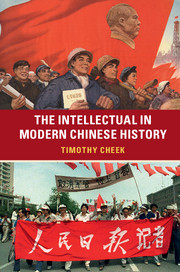Crossref Citations
This Book has been
cited by the following publications. This list is generated based on data provided by Crossref.
2016.
Books Received.
The China Quarterly,
Vol. 226,
Issue. ,
p.
593.
Boshier, Roger
2017.
Chinese students speak about their favourite teachers and university reform.
International Journal of Lifelong Education,
Vol. 36,
Issue. 1-2,
p.
210.
2017.
A Companion to Chinese History.
p.
378.
Lo, Leslie N. K.
and
Wang, Fang
2018.
Navigating Educational Change in China.
p.
93.
Hua, Lu
and
Galway, Matthew
2018.
Freedom and its limitations: The contemporary mainland Chinese debate over liberalism.
China Information,
Vol. 32,
Issue. 2,
p.
315.
Cheek, Timothy
Ownby, David
and
Fogel, Joshua
2018.
Mapping the intellectual public sphere in China today.
China Information,
Vol. 32,
Issue. 1,
p.
107.
Lo, Leslie N. K.
and
Wang, Fang
2018.
Navigating Educational Change in China.
p.
17.
Zhiyu, Li
and
Rocks, Morgan
2018.
The Sinosphere left looks at rising China: Missed dialogues and the search for an ‘Asian perspective’.
China Information,
Vol. 32,
Issue. 2,
p.
336.
Anshu, Shi
Lachapelle, François
and
Galway, Matthew
2018.
The recasting of Chinese socialism: The Chinese New Left since 2000.
China Information,
Vol. 32,
Issue. 1,
p.
139.
Cody, Sacha
2019.
“A new consciousness of the countryside”? Elite ruralism in contemporary China.
Asian Anthropology,
Vol. 18,
Issue. 1,
p.
21.
Orly, Selena
2019.
The official reappraisal of May Fourth intellectuals: Hu Shi in the Sinicization of Marxism.
China Information,
Vol. 33,
Issue. 3,
p.
257.
van Dongen, Els
2019.
Realistic Revolution.
Lekner, Dayton
2019.
A Chill in Spring: Literary Exchange and Political Struggle in the Hundred Flowers and Anti-Rightist Campaigns of 1956–1958.
Modern China,
Vol. 45,
Issue. 1,
p.
37.
Spakowski, Nicola
2019.
Dreaming a Future for China: Visions of Socialism among Chinese Intellectuals in the Early 1930s.
Modern China,
Vol. 45,
Issue. 1,
p.
91.
Wemheuer, Felix
2019.
A Social History of Maoist China.
Belogurova, Anna
2019.
The Nanyang Revolution.
Tam, Gina Anne
2020.
Dialect and Nationalism in China, 1860–1960.
Liu, Lu
2020.
Bacterial Imagination: Seeing the Enemy in the People’s Republic of China of the Early 1950s.
China Perspectives,
Vol. 1,
Issue. 2020,
p.
17.
2021.
Terror Capitalism.
p.
61.
2021.
Terror Capitalism.
p.
221.



